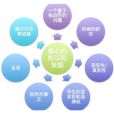英文
Project-based learning(PBL) is a student-centered pedagogyin which students learn about a subject through the experience of solving an open-ended problem found in trigger material. The PBL process does not focus on problem solving with a defined solution, but it allows for the development of other desirable skills and attributes. This includes knowledge acquisition, enhanced group collaboration and communication. The PBL process was developed for medical education and has since been broadened in applications for other programs of learning. The process allows for learners to develop skills used for their future practice. It enhances critical appraisal, literature retrieval and encourages ongoing learning in a team environment.
The PBL tutorial process involves working in small groups of learners. Each student takes on a role within the group that may be formal or informal and the role often rotates. It is focused on the student's reflection and reasoning to construct their own learning. The Maastricht seven-jump process involves clarifying terms, defining problem(s), brainstorming, structuring and hypothesis, learning objectives, independent study and synthesis. In short, it is identifying what they already know, what they need to know, and how and where to access new information that may lead to the resolution of the problem. The role of the tutor is to facilitate learning by supporting, guiding, and monitoring the learning process.The tutor must build students' confidence to take on the problem, and encourage the students, while also stretching their understanding. This process is based on constructivism. PBL represents a paradigm shift from traditional teaching and learning philosophy,which is more often lecture-based. The constructs for teaching PBL are very different from traditional classroom or lecture teaching and often requires more preparation time & resources to support small group learning.
中文
項目式學習是一種以學生為中心的教學方法,它提供一些關鍵素材構建一個環境,學生組建團隊通過在此環境裡解決一個開放式問題的經歷來學習。需要注意的是,項目式學習過程並不關注在學生們可以通過一個既定的方法來解決這個問題。 它更強調學生們在試圖解決問題的過程中發展出來的技巧和能力。他們包括如何獲取知識,如何計畫項目以及控制項目的實施,如何加強小組溝通和合作。項目式學習過程最初是為了醫學教學而發展出來的,從那以後被廣為傳播, 繼而使用在其他各個學科的教學中。項目式學習這個過程賦予學習者應對未來挑戰的能力。
項目式學習通常是在一個學習小組中進行,學生們在這個小組中有各自的角色,而這個角色會不斷輪換。在項目式學習中學生們的學習是通過自己的思考和推理來實現的。有一種七部法,包括弄清概念,定義問題,頭腦風暴,構建和假設,學習目標,獨立學習和概括總結。簡而言之,就是搞清楚他們已經知道的,他們需要知道的,去哪裡以及如何獲得新的有助於解決問題的信息。老師的角色是通過支持、建議和指導來幫助學生們更好的學習。老師必須要建立學生們敢於接受難題的自信心,鼓勵學生們,並且在必要時拓展他們對問題的理解。項目式學習代表了傳統的基於論文的教學模式的轉變。項目式教學和傳統的照本宣科教學非常不同,它需要更多的準備時間和材料來指導各個小組的學習。
意義
Wood (2003) defines Problem-based learning as a process that uses identified issues within a scenario to increase knowledge and understanding. The principles of this process is listed below:
伍德(2003)定義了項目式學習為利用確定環境下的確定的問題來增長知識和加深理解的一個過程。這個過程的幾個原則如下:
Learner-driven self-identified goals and outcomes/學習者自我驅動和自我定義的目標和產出
Students do independent, self-directed study before returning to larger group/學生們在返回大組討論時要做好獨立的,自我引導的學習
Learning is done in small groups of 8–10 people, with a tutor to facilitate discussion/學習以 8 至 10 人的小組形式進行,並配有導師以促進討論
Trigger materials such as paper-based clinical scenarios, lab data, photographs, articles or videos or patients (real or simulated) can be used/可以使用觸發材料,例如基於紙張的臨床場景、實驗室數據、照片、文章或視頻或患者(真實或模擬)
The Masstricht 7 jump process helps to guide the PBL tutorial process/七步法幫助指導項目式學習的整個過程
Based on principles of adult learning theory/基於成人學習理論的原則
All members of the group have a role to play/小組的所有成員都可以發揮作用
Allows for knowledge acquisition through combined work and intellect/允許通過工作與智力相結合的方式來獲取知識
Enhances teamwork and communication, problem-solving and encourages independent responsibility for shared learning - all essential skills for future practice/增強團隊合作和溝通、解決問題並鼓勵共享學習的獨立責任——未來實踐的所有基本技能

